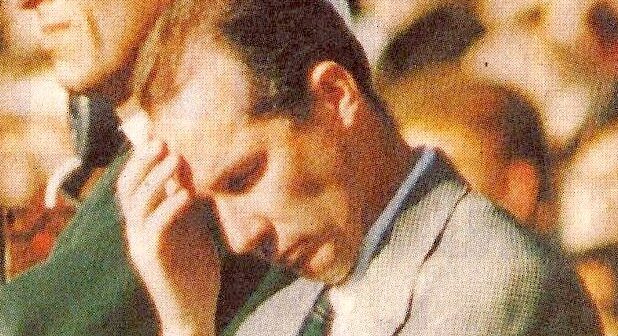LIAM BRADY was named as Billy McNeill’s successor as Celtic manager in June 1991.
The charismatic Irishman arrived with a dream for the club, but his vision had become blurred by the time he departed in early October 1993.
In another CQN EXCLUSIVE series, author Alex Gordon opens his book files to look back at an intriguing and compelling chapter in the club’s history.
Here is another edited extract from Alex’s tribute book, ‘The Winds of Change‘, published by CQN in 2015.
Please enjoy.
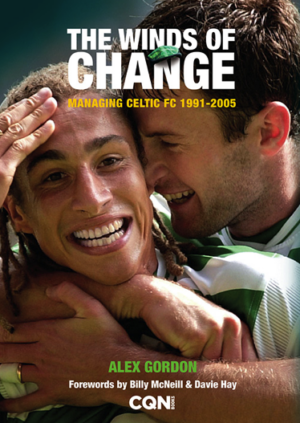
FIVE YEARS LATER, I was penning a magazine feature on Liam Brady. I decided to update the story of his traumatic time at Parkhead. Once again, the Irishman was only too happy and willing to talk about his experience. Once more, he refused to hide behind a mountain of excuses.
He said, ‘Yes I admit I made mistakes. I was new to football management and Celtic were one heck of a club to start off with. There were things that didn’t go right immediately and I made an error of judgement in the transfer market. I bought Tony Cascarino for £1.1 million and, unfortunately, he couldn’t cope with the pressure that is always on Celtic players.
‘Sadly, there was precious little time to turn things around at Parkhead. The pressure was simply relentless. It never went away. Rangers brought in plenty of players and some of them didn’t exactly produce the goods, but you can get away with things like that when the team is winning and isn’t under close examination or scrutiny.’
I was well aware Brady arrived in Glasgow in the summer of 1991 with every intention of maintaining the Celtic tradition of performing with exciting excellence.
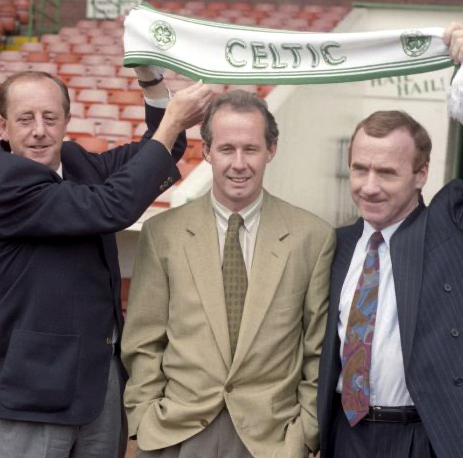
THE WE WERE…Liam Brady is flanked by assistants Mick Martin and Tommy Craig.
He continued, ‘Yes, that was my ambition. The Celtic support deserved that sort of team, that is what I wanted to give them. I’ll never forget my first game in charge – we won 4-3 against Dundee United at Tannadice. Scorelines like that would have kept those wonderful fans happy, I’m sure.
‘I can recall some smashing games in my time there and I hope the Celtic fans appreciated what I was trying to achieve. There were never any problems in the dressing room. The players were happy and I was working flat-out to run the club properly as far as the football team was concerned.’
Brady sighed before continuing. ‘There were so many divisions at Parkhead and, of course, it was a well known fact that the old board didn’t have a lot of money to spend in the transfer market. There was friction around the place and that gets through to the players – of course it does. Anyone who says it doesn’t has got it wrong.
‘You name me one club who has performed well out on the park when there has been trouble at boardroom level. It was all so frustrating. The Celtic fans were so unhappy and disillusioned with the old board that they refused to back the team. That affected us, too.
‘In my days, money was tight and I had to get it right with every player. There was no room for manoeuvre, no way of going out and buying another player if one purchase didn’t work out. Stuart Slater was like Cascarino. There can be no doubting his class, anyone at West Ham would tell you how good he was when he played at Upton Park.
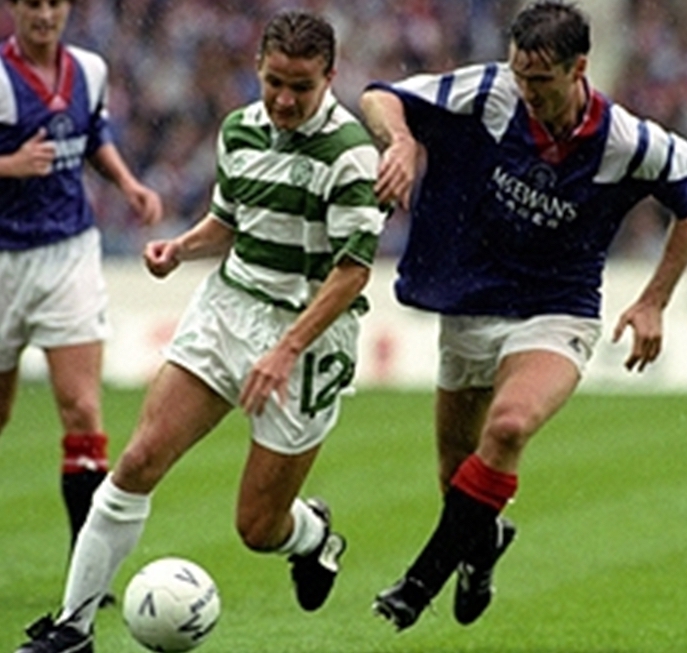
DERBY DAZZLER…Stuart Slater on the run as Rangers’ Ian Ferguson tries to stop him in his tracks.
‘He was a born entertainer, a typical Celtic player, if you like. However, it just didn’t work for him in Glasgow. Once more the strain showed and he never displayed the talents we all knew he possessed and that was a pity. But Glasgow and playing for Celtic can do that to you.
‘I’ve got to hold up my hands and say the pressure, without doubt, got to me, too. Of course, it did. You’ve got to ride the storm and, sadly, I couldn’t manage it. That was why I had to resign.’
I made the point that Brady had been given little back-up from the board who had presented him with the job in the first place. They were too busy ducking for cover behind the sandbags to give a first-time manager much-needed guidance.
‘It was a turbulent time,’ recalled Brady. ‘There can be little doubt about that. I had to cope with Terry Cassidy during my time and that was not a very pleasant experience, I can assure you. The trouble with Cassidy was that he was not a football man and, as such, did not understand football people.’
I enquired about the story that had come to my ears about a raucous slanging match in the office of the-then Chief Executive, who only kept the position for eighteen months. I had been informed the Celtic team boss left after having his forcible say to return to his office only yards away. His fax machine then kicked into action and a message came through stating, ‘Please don’t slam my door when you leave my office!’ True or false?
Brady actually laughed. ‘No, it wasn’t quite like that, but I do have a file of memos from Cassidy. There are some classics in that collection. You never know, maybe some day I’ll get them published as a book – it could be a best-seller! Yes, we had some stand-up rows, Cassidy and I. It did little for the morale of the place with things like that going on.
‘I wanted to manage the side and do my level best to put out a team that deserved to wear the green and white hoops. Simple as that, but there was interference from every corner.
‘When Cassidy eventually left, Celtic put in Michael Kelly to handle the club’s Press Relations department and things didn’t get any better. It all became a bit intense and it got to the stage that you had to continually look over your shoulder. So much for team harmony and pulling together. Yes, it was quite an experience managing Celtic Football Club!’
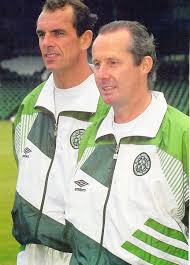
IT TAKES TWO…Liam Brady and assistant boss Joe Jordan.
I asked Brady if he nurtured any regrets about taking the job in the first place. The reply was typically forthright. ‘I had to give it a chance. Celtic are one of the big clubs of world football. You know, they talk about the luck of the Irish, but I didn’t get much when I was there. We seemed to keep tripping over when it came to important hurdles. We played three semi-finals in my time and lost them all.
‘I’m not going to start making excuses at this late stage, but a rub of the green would have helped us on all three occasions. We didn’t get it and the results – all 1-0 defeats – are now in the history books.
‘But we DID play an awful lot of good football and no-one can take that away from us. There was a lot on the plus side, as far as I was concerned. I would dearly have loved to have given the Celtic fans a trophy in my time there. The reason I moved out was to give someone else a crack at providing the goods.
‘When it got near to the end for me it was a very, very difficult time. I was aware of what the Celtic fans wanted. I knew about their desires for the club because they matched my own. Unfortunately, it didn’t work out.’
Brady summed up, ‘Nowadays, my wife Sarah must enjoy seeing me without the added stress. Glasgow was an experience that I wouldn’t have missed. However, it was tough, VERY tough, trying to cope with the in-fighting, boardroom takeover rumours and all that goes with managing a club such as Celtic.’
* TOMORROW: Don’t miss the riveting concluding instalment of the Liam Brady story – only in your champion CQN.

